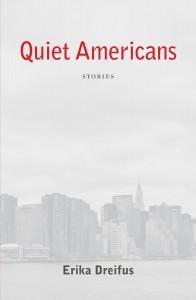Thursday’s Pre-Publication Post: The Blog Tour Is Coming! The Blog Tour Is Coming!
Busy, busy, busy. That’s how this time of year always is, right? But somehow, everything is even busier (and, of course, more exciting!) with the release of my short story collection, Quiet Americans, just a little more than a month away.
One of the pre-publication projects that I’ve been working on behind the scenes is a blog tour. You may be familiar with these “tours.” A quick way to explain the concept, as the Book Publicity Blog does in this excellent post, is that a blog tour involves “an author going from blog to blog (rather than from store to store as they would on a traditional book tour).” Since my book’s publisher is too small to have its own publicist (and, let’s face it: I’m a bit of a control freak as it is), I’ve taken on the job of arranging the tour myself. As work-intensive as the process is, I couldn’t be more grateful. The emergence of the blog tour concept is a real blessing for my book and me. Between the lack of a big-time publicity budget and my responsibilities at my “day job,” a traditional city-to-city tour just wasn’t in the cards.
So I am happy to announce that the Winter Blog Tour for Quiet Americans will launch the week of January 17, 2011, which is the same week that the book will be released. The tour will last a little over a month (touring will be light during the days I’ll be focusing on the Association of Writers & Writing Programs Conference in early February).
I’m so excited for this tour. I’ll admit that I’m a bit apprehensive, too. But mainly, I’m excited.
Right now, the biggest challenge ahead of me is content. The blog tour “stops” will feature a combination of interviews, book reviews written by various “hosts,” and some guest pieces that I’ll be writing up. Interview questions haven’t yet arrived, and the reviews, thankfully, are not my responsibility. So as soon as I finish my holiday cards, complete a freelance assignment with a fast-approaching deadline, and check one or two other things off my to-do list, I’ll be able to focus on preparing those guest posts.
I’ll also be working hard to showcase the participating host blogs. In fact, I can promise you the unveiling of the tour schedule and hosts three weeks from today, on Thursday, December 30. (There. I’ve just given myself another deadline!)
For now, I just hope that all of you who read this blog will share my enthusiasm. And I’d like to say an early, heartfelt “thank-you” to all of the tour hosts. Thank you for welcoming my book and me to your online homes. Thank you for reading the review copies. Thank you for the wonderful comments you’ve already shared with me about your reading experiences. Most of all, thank you for what you’re going to be doing in the next couple of months.
